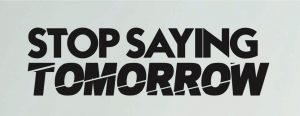Establishing and maintaining lifestyle changes can be challenging. The perceived difficulty alone can discourage us from ever even attempting to change our behaviors. However, success can be found through a multi-step process that includes setting goals, staying accountable, and reflecting on your progress. Stop saying tomorrow and follow these steps to get where you want to be.
Goals in Sight
Set Small Goals
When setting a goal, it is important to incorporate that goal into every aspect of your life so it becomes a habit. Write down your new goal and keep it in a location where it will constantly be seen. It is important to start by setting small goals. People often set a goal that is out of reach and then are disappointed when they do not reach it. By setting small goals, your success rates increase, which then allows for new goals to be set. This process then creates lasting habits.
Patience
One of the most important parts of creating a new habit is having patience. According to Elite Sports Club-Mequon’s Personal Training Coordinator, Jason Liegl, “Patience is crucial because in all likelihood you will not be 100% successful at adopting the habit right off the bat. There will be good days and bad days and you can learn equally from both.” Not every day will be the best, but pushing through the tough days will help you achieve your goal. Learning from your previous mistakes will allow for more success in the future.
Routine Building
During the planning process, one of the most important aspects is committing to a schedule. Without a commitment to a set weekly schedule, it is easy to get off track. Internal motivation plays a large role in committing to a new routine. To create a change in your mindset, you must be motivated and have a desire to stick to a new way of life. Habits are formed when an action is performed over and over again. That action becomes instinctive, which can lead to a sustainable behavioral change.

Helping Hands
Accountability
Find a support system of friends, family, and coaches who will hold you accountable to reach your goal. Working out and having a plan of action with a partner is always easier than trying to achieve a goal on your own. Whether your partner is a personal trainer or a friend, they are committing to helping you reach your goals and vice versa. They are there to push you and motivate you. There is also the internet community that can aid in accountability. Maybe you are someone who enjoys posting about your workouts or your homemade meals. Use this as a form of accountability to get closer to achieving your goal. Creating an Instagram page could be the right fit because it is essentially an online journal of the workouts and routines you are participating in. Your Instagram account also holds you at a standard because the platform’s community would be able to see when you are (or are not) making posts.
Leverage Positive Rewards
Many people get stuck on the idea that they have to reach their goal in order to reward themselves and, therefore, they do not celebrate the small steps along the way. Rewards, if used properly, can be an important part of the process. Jason describes a few “rules” he uses for rewards:
1.) Make sure your reward is commensurate with your goal. Making 3-4 workouts in a row is probably not worth a new purse.
2.) Make sure your reward is in concert with your goals. Looking to lose weight? Reaching that first 5 lbs of weight loss is probably not cause for going on an eating binge at an ice cream shop.
Reflections
Jason explains that it is also important to reflect on your progress and the process that took you from point A to point B, “because that is where the growth and change took place.” You will always be able to celebrate small steps that have been taken.
Prioritize
Prioritizing throughout the process is crucial so that your plan can run its course as smoothly as possible. “I recently ran a marathon and while the final race was satisfying, looking back, it was all of the days and miles of running that lead to my growth and development to achieve the marathon.” Although you may not always think about one small part of your training program, it often is the small steps that lead to success.
There will always be difficult days during training. It is not always easy to get your body ready for a workout. “The days I did not feel like running but still put on the shoes and did it. The days when there was 1,000 excuses to not run but knowing those are the days that would pay off during the race when your mind starts telling you to stop.” The ability to overcome challenging days will be crucial.
Pivot
While working on meeting a goal, it is important to be realistic and flexible. Sometimes there are bumps in the road and being able to adapt and change your plan around is a vital skill to have. Especially when dealing with working out, a plan may not always be followed perfectly, but it is possible for you to adapt to changes and re-evaluate as needed.
Track
Whether it is a mathematical tracking of numbers or a comparison of journal entries over an extended period of time, reflecting on where you started and the journey you took is important to compare your progress. Through tracking, you are able to see the small steps taken and new routines created during a given time period. Your tracker will show if you were successful in holding yourself accountable to achieving your goals. You can even incorporate positive rewards, such as stickers, into your journal to make sure your progress is noted. When used properly, a tracking system can help you see how much you have grown.
Whether your goal is getting back into exercise, losing weight, gaining muscle, or something else, looking back at the days when things were challenging are the most rewarding. As Jason would say, “No one remembers a great story that did not have some challenges, because they do not exist.”
To start tracking your goals and progress today, check out our free printable journal and habit tracking spreadsheet. You can download them at: eliteclubs.com/habits
Written by Jason Liegl, Certified Personal Trainer & AMP Program Director at Elite Sports Club – Mequon.
Jason re-joined Elite Sports Club-Mequon in 2008. He holds a BS in Fitness Management from UW-Parkside. Jason is a certified personal trainer through ACE. He is also certified by Titleist Performance Institute as a level 1 Golf Fitness Instructor, Functional Movement Specialist level 1, Functional Movement Systems level 1, Kettlebell Athletics level 1, and Precision Nutrition level 1 nutrition coach. Jason has experience in training athletes from almost every sport. His belief is that with a solid foundation and hard work, any athlete can get better!

